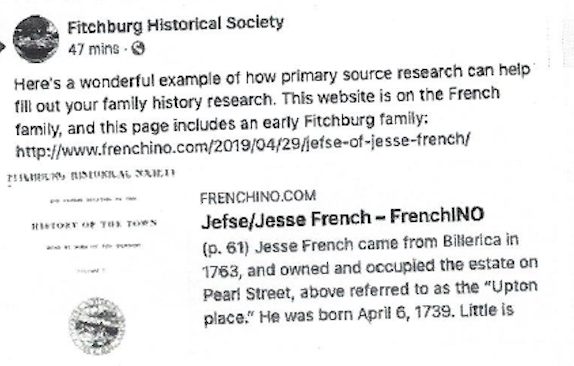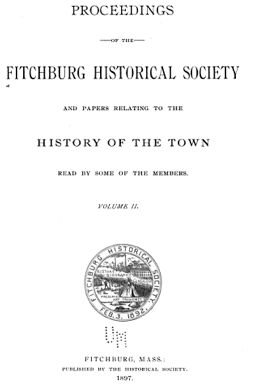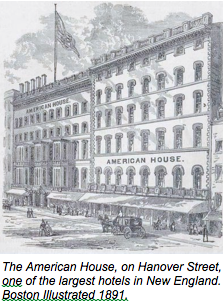Jefse/Jesse French
Jesse French is my 5th great paternal grandfather
(p. 61) Jesse French came from Billerica in 1763, and owned and occupied the estate on Pearl Street, above referred to as the “Upton place.” He was born April 6, 1739. Little is known of him. His name does not appear on the Lunenburg or the Fitchburg records as occupying any official position. He married, April 14, 1761, Abigail Jaquith. The births of eight children are recorded as follows:
Jesse, born at Billerica, October 11, 1762.
Samuel, born at Fitchburg, March 14, 1763.
Thomas, born at Fitchburg, May 8, 1765.
Luther, born at Fitchburg, September 25, 1767.
Abraham, born at Fitchburg, January 22, 1770.
Ebenezer, born at Fitchburg, June 19, 1772.
Abigail, born at Fitchburg, September 11, 1774. (died 1776)
Abigail, born at Fitchburg, June 6, 1777.
Some of his descendants lived here as late as
the middle of this century. Edmund, a grandson, (son of Thomas), now holds a
position in the office of the Pullman Palace Car Works, Pullman, 111.; and his
brother, Joseph C, is a retired druggist, at Indianapolis, Ind. A grandson of Jesse French, —Josiah B., —settled in Lowell, where he
was a prominent citizen, was president of a bank, manufacturer, railroad
manager, and in 1849 and 1850 mayor of the city.
(Page 38.) The roads across the territory were few in number and are indicated on the map. The principal and oldest ones were—the road entering the town from Lunenburg near Jonathan Holt’s place, and by Pearl and Blossom streets, turning west at a point now the corner of Main and Blossom streets, running over about the same location of the present Main and Prospect streets, over Flat Rock and Dean hill to Ashburnham; another entered the town near Ephraim Whitney’s place, running westerly and passing the garrisons of Joseph Spafford and Isaac Gibson, continuing over Pearl hill and northwesterly to the garrison of John Fitch. Another road started from a point near Jesse French’s place, on the first named road, running westerly to Jonathan Woods’ near the river, thence on about the location of the present Intervale Road, Bemis road, Wanoosnoc road and Turnpike road, near the garrison of Samuel Poole, and on to Westminster line.

Copyright © 2019. All Rights Reserved by David R. French.



